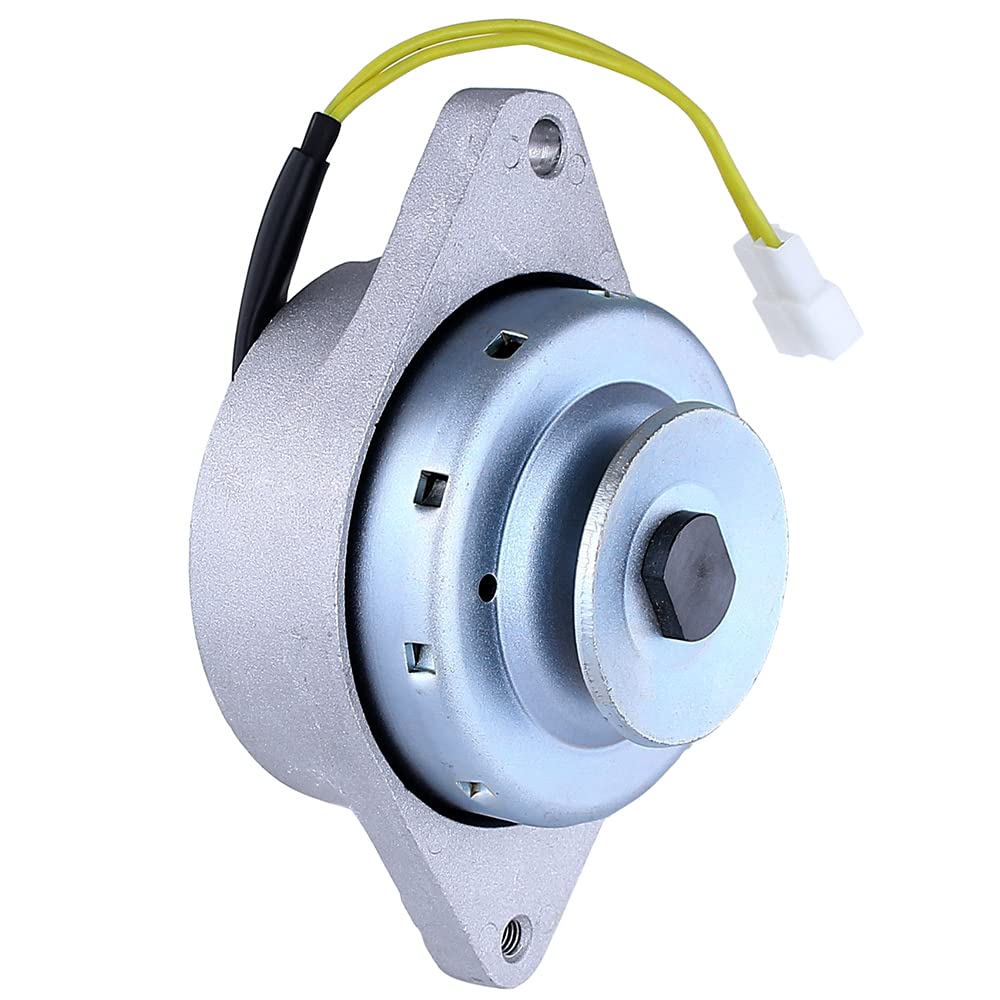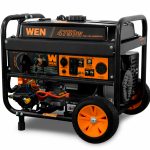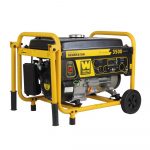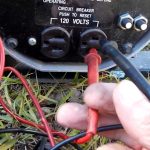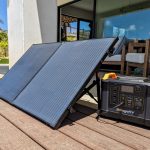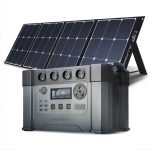A 20 amp generator is a device used to generate electricity. It typically produces electrical power in the range of 1000 to 2000 watts, depending on the model. A standard 20 amp generator can produce up to 2400 watts of power. However, the wattage range can vary depending on the type of generator and the fuel source being used. For example, a generator powered by natural gas typically produces a lower wattage than one powered by diesel fuel.
Additionally, some generators are capable of producing higher wattages when the engine is running at higher RPMs. If you’re looking to purchase a 20 amp generator, it’s important to consider the wattage you need. You can determine the wattage you need by adding up the wattage of the appliances or devices you will be powering. For example, if you want to power two 100 watt light bulbs, a 200 watt amplifier, and a 500 watt television, you will need 1000 watts of power. This means that a 20 amp generator should be sufficient for your needs.
How much can I run on 20 amps?
A 20 amp generator can provide a lot of power for running a variety of devices. It is capable of running up to 20 amps of electricity continuously. This is enough to power small appliances such as lights and fans, as well as larger items like power tools and air conditioners. Depending on the size and type of the device, the amount of power it consumes must be taken into account. For example, a power tool might require 15 amps, while a fan might require only 5 amps.
It is important to note that the 20 amp generator may not be able to support maximum load of 20 amps all at once. At this level, the generator may become overloaded, which can cause damage to both the generator and the device being powered. Therefore, it is important to check the total amperage of the devices being powered before connecting them to the generator. Finally, it is important to remember that a 20 amp generator is not designed to power large appliances like refrigerators and freezers. These items usually require 30 or more amps, which can easily overload the 20 amp generator. Therefore, it is best to avoid using a 20 amp generator for these types of appliances.
Is 20 amps enough for a garage?
A 20 amp generator is powerful enough for many uses, but the question remains whether it can power the appliances in a garage. When it comes to powering a garage with a 20 amp generator, there are a few things to consider. Firstly, the number of appliances being powered will determine if the 20 amps are enough. If the number of appliances is low and the wattage of each appliance is moderate then it is likely that the 20 amp generator will be sufficient. However, if you are looking to power multiple high wattage appliances, such as a refrigerator, water heater, or air conditioner, then the 20 amp generator will not be enough.
It is important to calculate the total wattage of all the appliances that you wish to power, and make sure that the wattage is less than the wattage of the generator. In conclusion, if you are looking to power a garage with a 20 amp generator, you need to consider the wattage and number of appliances being powered. If the wattage is low and the number of appliances is limited, then the 20 amp generator will be enough to meet your needs.
What can a 20 amp generator run?
The 20 amp generator can run power tools such as drills, saws and other high-powered tools. It can also run several small appliances such as microwaves, lights and televisions at the same time. The amount of power this generator can handle also makes it suitable for running small air conditioners and heaters. This is especially useful when camping or tailgating as it allows you to stay comfortable while you enjoy the outdoors. The 20 amp generator is also an excellent choice for powering essential medical devices such as breathing apparatuses and oxygen concentrators.
This generator can provide the necessary power to keep these devices running without interruption. In conclusion, a 20 amp generator is a versatile and powerful tool. It can be used to provide consistent power in a variety of situations, ranging from powering essential medical devices to running large appliances and power tools.
How much can 20 amps handle?
A 20 amp generator can handle a lot of power! It is capable of powering a wide range of items from appliances to electronics. Depending on the specific device, it can handle up to 20 amps or 2400 watts of power. Some of the common items that can be powered by a 20 amp generator include refrigerators, microwaves, power tools, and computers. When using a generator, it is important to make sure the wattage of all appliances and tools being powered is not higher than the generator’s capability. If the wattage is too high, it can overload the generator and cause damage.
If you are unsure of the wattage of a device, it is best to consult the manufacturer’s instructions. It’s also important to check local regulations before operating a generator. Many municipalities have restrictions on the use of generators in certain areas. A 20 amp generator is a powerful device that can provide plenty of energy for your needs. With the right precautions, you can keep yourself and your devices safe.
How many watts can I run off a 20 amp breaker?
Using a 20 amp generator, you can run up to 2400 watts off a 20 amp breaker. This is the maximum wattage you should run off of a single breaker due to safety concerns. Overloading a single breaker can lead to electrical fires or other dangerous situations. It is important to keep in mind that a 20 amp generator cannot effectively power large appliances like refrigerators or air conditioners, which typically require more power. Therefore, it is important to calculate the wattage of your appliances before connecting them to the generator. If you need more power than the 20 amp breaker can provide, you can use two or more 20 amp breakers in parallel to provide additional capacity. With careful planning and consideration of the wattage requirements of your appliances, you can safely and efficiently use a 20 amp generator.
What is the smallest generator that can power a house?
A 20 amp generator is one of the smallest generators that can power a house. It is sufficient for basic appliances such as a fridge, lights and a television. Other larger appliances such as a washing machine or air conditioner will likely not be powered by a 20 amp generator. The 20 amp generator is usually powered by gasoline, diesel or propane. It is relatively lightweight and easy to transport and operate.
It is ideal for emergency situations or outdoor activities such as camping where electricity is not available. This type of generator is also suitable for powering small businesses and construction sites. It is able to provide enough electricity to run tools and lights, but not large machinery. The 20 amp generator is an economical option compared to larger generators, as it consumes less fuel and produces less noise. Overall, the 20 amp generator is an excellent choice for powering small appliances in a home or small business. It is reliable, economical and easy to operate, making it a great solution for emergency power and temporary use.
What size generator do I need for a 2 bedroom house?
Choosing a generator for your two bedroom house can be a confusing task. If you are looking for a 20 amp generator, you will need to determine the wattage of the items you plan to power. Generally, a 2000 watt generator is sufficient for a two bedroom house. This will allow you to power smaller items such as lights, fans, and small appliances. If you plan to power larger items such as a refrigerator, you may need a larger generator.
For example, a 3000-5000 watt generator can power a fridge and freezer, as well as lights and other smaller items. Before buying a generator, it is important to consider the wattage of all the items you plan to power. This will help you determine the size of generator you need. If you are unsure of the wattage of certain items, consult the manufacturer’s manual or check the wattage rating list online. If you are looking for a 20 amp generator for your two bedroom house, a 2000-5000 watt generator should be sufficient, depending on the items you plan to power. After considering the wattage of all the items, you should have a better idea of what size of generator you need.
What size generator is needed to run an average house?
A 20 amp generator is more than enough to power an average house. This means that a 20 amp generator can provide enough power for the basic necessities, such as lights, television, and small kitchen appliances like a refrigerator or microwave. If you plan to use heavy-duty appliances, such as an air conditioner, a larger generator may be necessary. However, a 20 amp generator is usually sufficient for everyday use. It is important to consider the wattage that you need to power your home when looking for a generator.
A 20 amp generator typically produces between 2,400-2,800 watts of power. This should be more than enough to power the essential items in an average household. When choosing a generator, it is also important to consider how long it can run. A 20 amp generator should be able to run for at least 10 hours, depending on the load it is under. This should provide enough power for most households. Overall, a 20 amp generator is more than enough to power an average house. It is important to take into account all of the wattage and running time when selecting a generator for your home.
Can a gas generator power a house?
A 20 amp generator is capable of providing enough energy to power a house. Generally, gas generators are reliable and powerful enough to provide sufficient power for a residential home. The size of the generator will play a major role in how much power it can provide. A 20 amp generator is capable of providing enough energy to run the essential appliances in a standard home. This type of generator is reliable and efficient, and can provide a reliable power source during a power outage. The generator would need to be connected to the home’s existing electrical system for it to be able to power the entire house. A 20 amp generator can provide enough power to run lights, small appliances, and other essential equipment in a house.
Is it cheaper to run a generator on gasoline or propane?
When it comes to running a 20 amp generator, the question of whether it is cheaper to run it on gasoline or propane often arises. The answer depends on many factors, such as the cost of the fuel and the efficiency of the generator. Generally speaking, propane is a cleaner and more efficient fuel, so it is often the better choice in terms of cost. Propane is a stable fuel and it is less likely to degrade over time, which is an important factor when deciding whether to run a generator on gasoline or propane. Propane is also often more affordable than gasoline, making it a more cost-effective option.
Propane has a higher octane rating than gasoline, which means it is more energy efficient and produces less emissions. As a result, it is better for the environment and it can save you money in the long run. Another advantage of running a 20 amp generator on propane is that it is easier to store. Propane is a compressed gas and it can be stored in a tank that is much smaller than what would be necessary to store gasoline. This means that you can keep more of it on hand at any given time, which can be a great benefit if you need to keep your generator running for an extended period of time. Overall, running a 20 amp generator on propane is often the more cost-effective choice compared to using gasoline. Not only does it have a longer shelf life and is more energy efficient, but it is also easier to store and better for the environment.
What happens to a generator when the power comes back on?
When a 20 amp generator has been running without power, and then the power comes back on, the generator will no longer be needed. It will be shut off and the load will be transferred back to the power supply. The generator must be cooled down, as the engine can get quite hot during operation. A generator should never be shut down right away if it has been running for a long time – it needs time to cool down. Once the generator is cooled down, any fuel left in the tank must be drained to avoid potential combustion or damage to the engine.
Additionally, all of the connections should be double checked to make sure there are no loose wires or other safety issues. Finally, the generator will need to be stored in a safe place to guard against potential damage from the elements. This may include covering it with a waterproof tarp or storing it in a covered area. With the proper steps taken, a 20 amp generator can be safely stored away until it’s needed again. Taking the time to properly care for your generator will ensure that it runs safely and efficiently when it’s needed.
How many watt generator do I need to run a small house?
If you are looking to run a small house with a 20 amp generator, you should look to get one with a minimum of 4,000 watts. This will provide enough power to run basic appliances like a refrigerator, several lights, and a television. If you plan to use heaters, washers and dryers, or other large appliances, you will need at least a 5,000 watt generator. To determine the exact wattage you need for your small house, you’ll need to take inventory of the appliances and other items you plan to power with your generator. For instance, if you have a washing machine with a 1,500 watt motor, a refrigerator with a 500 watt motor, five lights at 100 watts each, and a television set at 250 watts, that adds up to 2,350 watts.
If that’s all you plan to run with your generator, you’ll need a 4,000 watt unit. However, it’s always wise to get a generator with a higher wattage than your total requirement, as this provides some wiggle room in case you add more appliances later. It’s also important to note that wattage is a measure of power, not capacity. A 4,000 watt generator may only be able to produce power for a few hours before it needs to be refilled with fuel. That’s why it’s important to factor in usage time when determining the generator size you need. Overall, if you’re looking to run a small house with a 20 amp generator, you’ll need one with at least 4,000 watts – and you’ll also want to factor in usage time and the possibility of adding more appliances later for optimal power usage.
How do you plug a generator into your house?
Plugging a 20 amp generator into your house can be a great way to provide emergency backup power. It’s important to remember to use the correct wiring and plugs when connecting the generator. First, you’ll need to install a manual transfer switch to your main electrical panel. This will separate the generator from the utility service so you won’t overload the system. Next, you’ll need to run a heavy-duty power cord from the transfer switch to the generator.
Make sure the connection is well-sealed and secure. Then, plug the generator into a power outlet on the transfer switch. Finally, to complete the setup, you’ll need to turn on the main circuit breaker and then start the generator. Once the generator is running, you should be able to power certain appliances in your home. Be sure to check the wattage of the items you plan to plug in to ensure the generator can handle the load.
